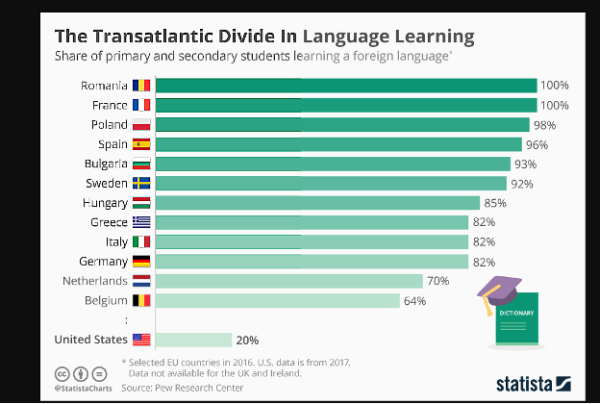U.S. college students should be required to learn a foreign language; it could provide opportunities for their prospective careers, and add a practical skill set to their everyday life.
The U.S. is a “melting pot” of different ethnicities and cultures. With that, there should come a natural tendency to know and learn more than English. This is not the case for most U.S students. According to Pew Research Center throughout all 50 states only 20-25% of students learn a foreign language lagging behind their European counterparts an average 72% .
This statistic is painfully below their European counterparts. Pew states “A median of 92% of European students are learning a language in school. Most primary and secondary school students across Europe study at least one foreign language as part of their education.”
Language Learning has been a standard educational requirement for many European countries for elementary and up, in comparison only 10 states and the District of Columbia have foreign language as a graduation requirement. This leads to a low population of U.S students who know any other language than the standard.

PEW believes that this low statistic is because the skill of knowing a foreign language is not viewed as beneficial to the economy. This belief is not supported by The World Economic Forum (TWEF).
TWEF holds that citizens knowing more than one language is beneficial to the economy. “Multilingualism is good for the economy, researchers have found. Countries that actively nurture different languages reap a range of rewards, from more successful exports to a more innovative workforce.”
The research shows that companies which focus on hiring multilingual employees build trade relations, accessing more countries to export to, in turn also bring in more imports as well. TWEF also holds that, for employees, knowing a second language alone can boost earning power without it being required. Having a second language in their skill set is a sign of a good education.
TWEF mentions that knowing a second language also has more personal benefits. Knowing a second language has been shown to improve brain health, by improving the ability to process information and concentrate.. Science Direct also shows research that it can also help prevent degenerative mental disorders, such as dementia.
By making it a requirement to learn a foreign language, colleges are increasing the chances for their students’ future prospective careers to be successful, and the future of the United States economy.








































